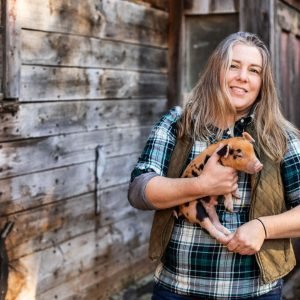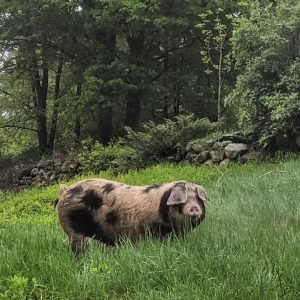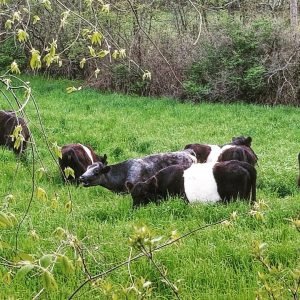Valley Bounty: Stillman Quality Meats
 Kate Stillman’s farming roots are set in four generations of livestock, dairy, fruit, and vegetable farming. Stillman’s boots stepped onto the family’s path at age nine, starting by selling at farmers’ markets. Stillman narrates, “I grew up like a real, bona fide Massachusetts farm girl. We ate pork from pigs my grandfather raised and smoked. We had our own beef, our own eggs, and chicken. Growing food small was a way of life and that’s what we did. I took all that for granted, growing up.”
Kate Stillman’s farming roots are set in four generations of livestock, dairy, fruit, and vegetable farming. Stillman’s boots stepped onto the family’s path at age nine, starting by selling at farmers’ markets. Stillman narrates, “I grew up like a real, bona fide Massachusetts farm girl. We ate pork from pigs my grandfather raised and smoked. We had our own beef, our own eggs, and chicken. Growing food small was a way of life and that’s what we did. I took all that for granted, growing up.”
Stillman expected to take over her family’s greenhouse business, which grew high-end garden stock and cut flowers. “I knew I always wanted to farm,” she noted. As a young woman representing her family’s operation at markets, she paid close attention to the market offerings.
 At the time, protein was scarce at markets, and Stillman recognized that her family’s farm was in the unique position of being able to offer a complete meal of vegetables and protein to customers. Stillman remembers, “There really wasn’t anybody doing it. There was only one other person doing it, so there was a huge demand, so I just went along with it.”
At the time, protein was scarce at markets, and Stillman recognized that her family’s farm was in the unique position of being able to offer a complete meal of vegetables and protein to customers. Stillman remembers, “There really wasn’t anybody doing it. There was only one other person doing it, so there was a huge demand, so I just went along with it.”
This vision of offering a complete meal set Stillman on a different path. She charted her own course by creating a vertically integrated farm model that begins with raising young animals and goes through delivery of fresh meat for customers’ plates. “Growing food small on the farm was our way of life. You ate good meat,” says Stillman.
As the butchery started, terms like “pasture-raised” or “cage free” were new buzzwords for the animal husbandry and craft butchery the Stillman family had been doing since the late 1800s to feed their own family. “I believe in this model genuinely,” she adds. That conviction spoke to her community, and they supported her. “It took off faster than I thought,” Stillman reminisces.
The team at Stillman Quality Meats consists of 6-10 people, including family members. “Animals don’t take a hurricane off, or they get up at night and have babies. It’s 24/7,” she laughs. “We never caught up from the pandemic on staffing,” Stillman notes. “The way I’ve dealt with it, is we’ve upgraded as much as we can with technology and equipment to meet the demand.”
 The butchery is Stillman’s highest labor demand, so since the pandemic, she bought an extra grinder and an extra slicer; on the animal side, Stillman automated as much as possible with automatic feeders and waterers. One person can do the job of two people by using these tools. Both in her roles as boss and farmer, Stillman offers tools and technology to support her highly skilled team members. “Technology is not meant to replace labor—it’s to respect and save the labor that you have,” Stillman concludes.
The butchery is Stillman’s highest labor demand, so since the pandemic, she bought an extra grinder and an extra slicer; on the animal side, Stillman automated as much as possible with automatic feeders and waterers. One person can do the job of two people by using these tools. Both in her roles as boss and farmer, Stillman offers tools and technology to support her highly skilled team members. “Technology is not meant to replace labor—it’s to respect and save the labor that you have,” Stillman concludes.
In her farm newsletters, Stillman signs off as “Farm-her Kate.” She is thoughtful about the contributions of women to farming, including butchery. Stillman’s grandmother and great aunt ran their farms. “The tractor was the cool masculine thing that got all the attention,” she laughs.
“Women have always been prominent in farming, and they do a damned good job farming, and what really changed it, was we have a tool—the cell phone—that allows us to get our personal stories out,” says Stillman, speaking of the biggest changes to farming. “This can be a tough business with a lot of guts and no glory—quite literally,” she laughs.
Although female in a male-dominated field, the bigger challenge was starting as a 27-year-old and employing people twice her age. Over fourteen years, Stillman grew into her role and business, “You have to be a boss in this industry. Producing food is serious business because there’s a lot on the line. In cut meat, there are a lot of regulations and paperwork. It’s high stress.” Stillman is grateful to have a team that allowed her to get started and let her learn as a young woman. “It’s been a good experience, and I’ve learned a lot,” she adds.
Reaching for customers who are accustomed to shopping in grocery stores gave Stillman a challenge. “Most farm-raised meat is frozen. It looks different and tastes different. It’s expensive because you’re paying the real cost of the product.” Stillman contends, “You have to find special customers who are willing to drive to your farm, have faith in your product, and try it. At the end of the day, this meat is higher quality, and it tastes better. That’s the starting point to all of this,” Stillman notes.
Education has been key, and Stillman has proven that fresh farm-raised meat is attainable, resulting in a desirable product for her customers. “People like the taste and flavors. That’s important to me because I really want to deliver the goods to people,” says Stillman. “It wasn’t easy to learn how to make sausages that taste great or to learn how to cut fresh steaks, merchandise them, and get them out the door to people. That’s probably been the biggest victory,” she notes. Stillman concludes, “You can’t be in this business unless you really, really love it.”
 To taste Stillman Quality Meats, come to CISA’s Local Loves Local event on Thursday, September 8th at Four Star Farms Brewery in Northfield from 5:30-7:30pm. Stillman burgers, local corn, and local beer will be on tap. Tickets online at https://www.buylocalfood.org/LLL.
To taste Stillman Quality Meats, come to CISA’s Local Loves Local event on Thursday, September 8th at Four Star Farms Brewery in Northfield from 5:30-7:30pm. Stillman burgers, local corn, and local beer will be on tap. Tickets online at https://www.buylocalfood.org/LLL.
To buy Stillman Quality Meats, customers can pre-order on their website for pickup at their Farmstead at 3674 Greenwich Road in Hardwick or opt for home delivery. Orders are packed in a cardboard box with insulation using dry ice and ice packs for two-day ground shipping. In October, Stillman Quality Meats plans a full-service butcher shop, where customers can visit the farm, buy fresh meats, and request custom meat cutting from the pros. Watch their website for details.
Lisa Goodrich is communications coordinator for CISA (Community Involved in Sustaining Agriculture). To learn more about local farms, what’s in season, and where to find it, visit buylocalfood.org/find-it-locally.

